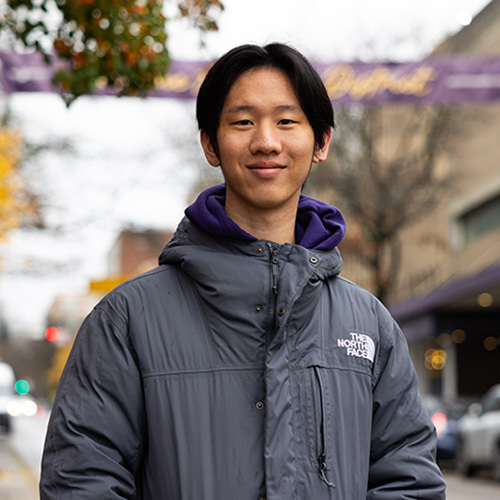When Popular Science magazine wanted innovative ideas for its World Design Challenge—an annual competition to devise creative solutions for complex problems—it invited the UW’s Center for Digital Arts and Experimental Media (DXARTS) to participate.
DXARTS faculty and students, always intrigued by a challenge, jumped at the chance. The result: an “out of the box” solution to reducing underwater noise affecting whales and other marine mammals. The entry, described in the July 2004 issue of Popular Science, earned the DXARTS team the Editor’s Choice Award.

Popular Science created the competition with CARE, the humanitarian aid organization. “Groups were asked to propose communities of need in the future, and then create a technological CARE package,” says Shawn Brixey, associate director of DXARTS, who was joined by research associate Bret Battey and visiting researcher Ian Ingram for the project. “The ideas could be really out there, which appealed to us.”
There were some limiting factors. The “package” had to fit onto a palette that could be delivered by airdrop, reflecting CARE’s delivery methods. And although solutions could involve future technology, it had to be realistic future technology.
The DXARTS team came up with 25 “pie-in-the-sky, implausible ideas,” and then pursued those they found most promising. “When Ian brought up the whale idea, I remember saying, ‘Team! This is going to win. Go for it,’” says Brixey.
Their focus was the detrimental effect of man-made sounds—due to shipping, airplanes, seismic exploration for undersea oil, and Navy sonar exercises—on ocean animals. Symptoms can range from mere confusion to death in some marine mammals, especially certain whale species.
The team found that there had been considerable research on noise reduction
in air, but almost nothing about noise reduction in water, especially noise emitted from a single source, like a sonar beacon. They devised underwater vehicles that would pick up such sounds, calculate the inversion of those sound signals, and send those inverted signals out to help reduce the sound—a technique called “active absorption.” The goal was also to make the robotic vehicles whale-like so they would swim with, and be accepted by, the whales they were designed to protect.
“I like making robots that mimic the shape and function of organic life,” explains Ingram, who has some background in ocean robotics and ocean acoustics. “The whales may recognize that the vehicles are not whales, but we think they might be comfortable with them if they seem like whales, just as humans are more comfortable with human-looking robots.”

The team also devised a method for multiple underwater vehicles to communicate using acoustic modems. A modem on the ocean’s surface, teamed with a drone—an airplane controlled remotely via radio frequencies— would send simple commands to the vehicles, also equipped with modems.
Of course, none of this will happen any time soon. For this competition, the idea itself was the product. But Brixey doesn’t rule out the possibility of pursuing this further.
“Given that we were able to produce this idea with such a short turnaround time, I do think that we would, if given the chance, be able to produce a prototype. Maybe that will happen in the future.”
More Stories

Bringing Music to Life Through Audio Engineering
UW School of Music alum Andrea Roberts, an audio engineer, has worked with recording artists in a wide range of genres — including Beyoncé.

A Healing Heart Returns
In February, the UW Symphony will perform a symphony that Coast Salish elder Vi Hilbert commissioned years ago to heal the world after the heartbreak of 9/11. The symphony was first performed by the Seattle Symphony in 2006.

The Public Impact of Private Cities
Geography major Edwin Bai has researched private cities, developed by individuals and corporations, that "take the libertarian idea of low government regulation to the maximum."